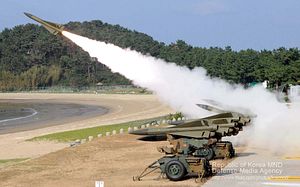North Korea’s latest nuclear test strengthened the sections of public opinion that approve of obtaining nuclear weapons in South Korea and Japan. The test, then, could bring about a chain reaction and accelerate the pace of Japanese and South Korean efforts to possess nuclear weapons. Under these circumstances, China will face not only a threat from the Terminal High Altitude Area Defense (THAAD) system, but also the further deterioration of Northeast Asia’s strategic environment.
In my opinion, the biggest challenge posed to China by this North Korean nuclear test is that South Korea’s domestic support for nuclear weapons may increase. Since Kim Jong-un assumed leadership of North Korea — especially this year — public support for possessing nuclear weapons and turning South Korea into a nuclear state has reached a certain scale. South Korea has been protected by the U.S nuclear umbrella, but now more and more people in South Korea want to build up a domestic nuclear deterrent to balance against North Korea.
On July 1, President Park Geun-hye suddenly decided to deploy the U.S. THAAD system in South Korea. In the following two months, domestic voices advocating for possessing and/or developing nuclear weapons have been constantly coming from South Korea. These voices will get even louder after the latest nuclear test in North Korea. It is said that the tested nuclear warhead was miniaturized, but its blast is estimated to be very large. Readings of the seismic activity in North Korea indicate that the test was very successful. Therefore, South Korea is currently enveloped by the sense of a national security crisis and many now believe that it is not enough to only have United States’ nuclear protection. So North Korea’s nuclear test may further stimulate South Korea to acquire nuclear weapons or develop nuclear weapons, which is also a big challenge for the United States.
In fact, strong technical conditions and economic ability would enable South Korea to develop nuclear weapons in a very short time. Of course, for the foreseeable future, it’s still unlikely for South Korea to develop nuclear weapons, either under the present government lead by Park Geun-hye or the next government, which will come to power in February 2018. But we can’t ignore the fact that South Korea’s domestic demand for nuclear weapons is increasing.
Meanwhile, U.S.presidential candidate Donald Trump advocated that both South Korea and Japan should have nuclear weapons. This is actually a tacit admission of South Korea and Japan’s rights to possess nuclear power, which means the United States would no longer bear the responsibility of nuclear protection for Japan and South Korea (or would at least bear less responsibility). As to the matter of whether Japan and South Korea should have nuclear weapons or not, there are divergent opinions in the United States. Should the international political resistance disappear, and the United States no longer control the nuclear weapons policy of Japan and South Korea, it would be a piece of cake for Japan and South Korea to have nuclear weapons, given their own technology and economic strength. Under the current situation, public opinion on possessing nuclear weapon has been strengthened by the North Korea nuclear test. This is very likely to accelerate the pace of Japan and South Korea seeking to possess nuclear weapons.
If Japan and South Korea become nuclear states, the pattern and order of the whole Northeast Asia region would be completely shifted. In the future, if South Korea and North Korea can really form a balance of nuclear deterrence, the situation on the Korean Peninsula may be stable. But before that occurs, the Korean Peninsula could repeat a “Cold War” style pattern. If so, that would also bring China into an unfavorable situation.
Obviously, this nuclear test has hurt China’s national security interests and affected the stability of northeast China, reminding China to resolutely oppose the deployment of THAAD and thoroughly implement the UN’s sanction against North Korea. North Korea chose to carry out the test shortly after the closing of the G20 Hangzhou summit, which is also an overt provocation to global harmony. Altogether, this means that China needs to rethink the North Korea issue thoroughly and make adjustments to some important policies.
Pang Zhongying is a Senior Fellow of the Pangoal Institution and Professor of International Studies at Renmin University, China. The Pangoal Institution is a leading think tank in China, joined by renowned scholars and senior practitioners in China and elsewhere.

































